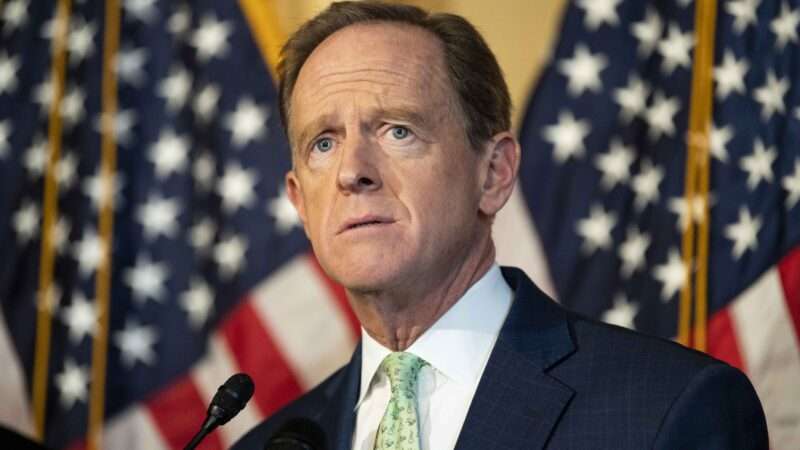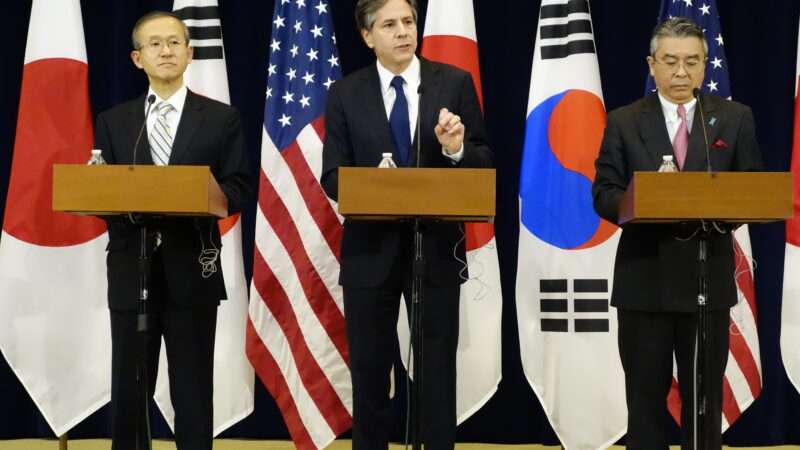
The Trump campaign’s post-election lawsuits have been almost uniformly unsuccessful, key states are moving ahead with certification of their results, and the General Services Administration has finally recognized Joe Biden as the probable president-elect. Although Donald Trump still insists he is not conceding, a growing number of Republican lawmakers are urging him to do so, or at least acknowledging that his wild fraud claims have not panned out. Joining a small group of GOP legislators who promptly recognized Biden’s victory, several senators and representatives who initially took a wait-and-see approach recently said we have waited long enough.
Sen. Mitt Romney (R–Utah), a Trump critic who supported impeachment and said he did not vote for the president, congratulated Biden on his victory more than two weeks ago, after major news outlets projected him as the winner. Sen. Lisa Murkowski (R–Alaska) likewise acknowledged Biden’s victory on November 7, as did Reps. Don Young (R–Alaska), Adam Kinzinger (R–Ill.), John Shimkus (R–Ill.), Paul Mitchell (R–Mich.), Tom Reed (R–N.Y.), Will Hurd (R–Texas), and Denver Riggleman (R–Va.).
Rep. Francis Rooney (R–Fla.), who congratulated Biden the following day, wrote a November 15 op-ed piece for The Hill headlined “Time to Concede.” Rep. Don Bacon (R–Neb.) admitted on November 8 that “the handwriting is on the wall that Joe Biden has been elected as the next President.” Sen. Susan Collins (R–Maine) congratulated Biden on November 9, and Rep. John Curtis (R–Utah) recognized him as the president-elect the same day.
Rep. Jim Durkin (R–Ill.) chimed in last week. “The election is over,” he told the Chicago Sun-Times on November 19. “Begin the transition process.”
Last Thursday, Sen. Ben Sasse (R–Neb.) cast doubt on Trump’s attempts to reverse the outcome of the election. “What matters most at this stage is not the latest press conference or tweet, but what the president’s lawyers are actually saying in court,” he told The Washington Post. “When Trump campaign lawyers have stood before courts under oath, they have repeatedly refused to actually allege grand fraud—because there are legal consequences for lying to judges.”
Sen. Marco Rubio (R–Fla.) likewise has been skeptical of Trump’s election fraud charges. “Taking days to count legally cast votes is NOT fraud,” he tweeted on November 4, although he added that “court challenges to votes cast after the legal voting deadline is NOT suppression.” Last week Rubio casually referred to Biden as the “president-elect.”
Rep. Liz Cheney (R–Wyo.), who chairs the House Republican Conference, initially said “it’s the responsibility of the courts” to address election fraud claims. But by last Friday, she was losing patience. “The President and his lawyers have made claims of criminality and widespread fraud, which they allege could impact election results,” she said. “If they have genuine evidence of this, they are obligated to present it immediately in court and to the American people.”
On Saturday, after a federal judge scathingly rejected the Trump campaign’s attempt to block certification of Pennsylvania’s vote, Sen. Pat Toomey (R–Pa.), who had earlier noted that “the president’s allegations of large-scale fraud and theft of the election are just not substantiated,” said it was time for Trump to accept reality. “President Trump has exhausted all plausible legal options to challenge the result of the presidential race in Pennsylvania,” Toomey said in a press release, noting that Saturday’s ruling followed legal defeats for the Trump campaign in other states. “These developments, together with the outcomes in the rest of the nation, confirm that Joe Biden won the 2020 election and will become the 46th President of the United States….President Trump should accept the outcome of the election and facilitate the presidential transition process.”
Sen. Lamar Alexander (R–Tenn.) took the same step yesterday. “The presidential election is rapidly coming to a formal end,” he said. “Recounts are being completed. Courts are resolving disputes. Most states will certify their votes by December 8. Since it seems apparent that Joe Biden will be the president-elect, my hope is that President Trump will take pride in his considerable accomplishments, put the country first and have a prompt and orderly transition to help the new administration succeed. When you are in public life, people remember the last thing you do.”
Yesterday Sen. Bill Cassidy (R–La.) also acknowledged Biden’s victory. “With Michigan’s certifying it’s [sic] results, Joe Biden has over 270 electoral college votes,” he tweeted. “President Trump’s legal team has not presented evidence of the massive fraud which would have had to be present to overturn the election. I voted for President Trump but Joe Biden won. The transition should begin for the sake of the country.”
Sen. Shelley Moore Capito (R–W.Va.) issued a similar statement yesterday. “I have been clear that President Trump—like any candidate for office—has the right to request recounts and to raise legal claims before our courts,” she said. “However, at some point, the 2020 election must end. The window for legal challenges and recounts is rapidly closing as states certify their results in the coming days. If states certify the results as they currently stand, Vice President Joe Biden will be our next president and Senator Kamala Harris will be our next vice president. I will respect the certified results and will congratulate our nation’s new leaders, regardless of the policy differences I might have with them.”
By USA Today’s count, “about a fifth of the Republican Senate has explicitly acknowledged Biden’s victory.” The paper notes that “some GOP senators, including Sens. John Cornyn, Ted Cruz and James Lankford, have called on Biden to receive intelligence briefings but have declined to call him president-elect.”
One of the Senate holdouts is Trump critic-turned-toady Lindsey Graham (R–S.C.), whom Georgia Secretary of State Brad Raffensperger, a fellow Republican, recently accused of suggesting that he should find a way to disqualify Biden-favoring absentee ballots in that state. Graham said that was a misunderstanding. But he has not been shy about reinforcing Trump’s claims of consequential election fraud. “If Republicans don’t challenge and change the U.S. election system, there will never be another Republican president elected again,” he said on Fox News two weeks ago.
“I think the election is not over until the votes are counted and the legal challenges are decided,” Graham told reporters around the same time. “That’s why I would encourage the president not to concede.”
from Latest – Reason.com https://ift.tt/3l2k1n9
via IFTTT


